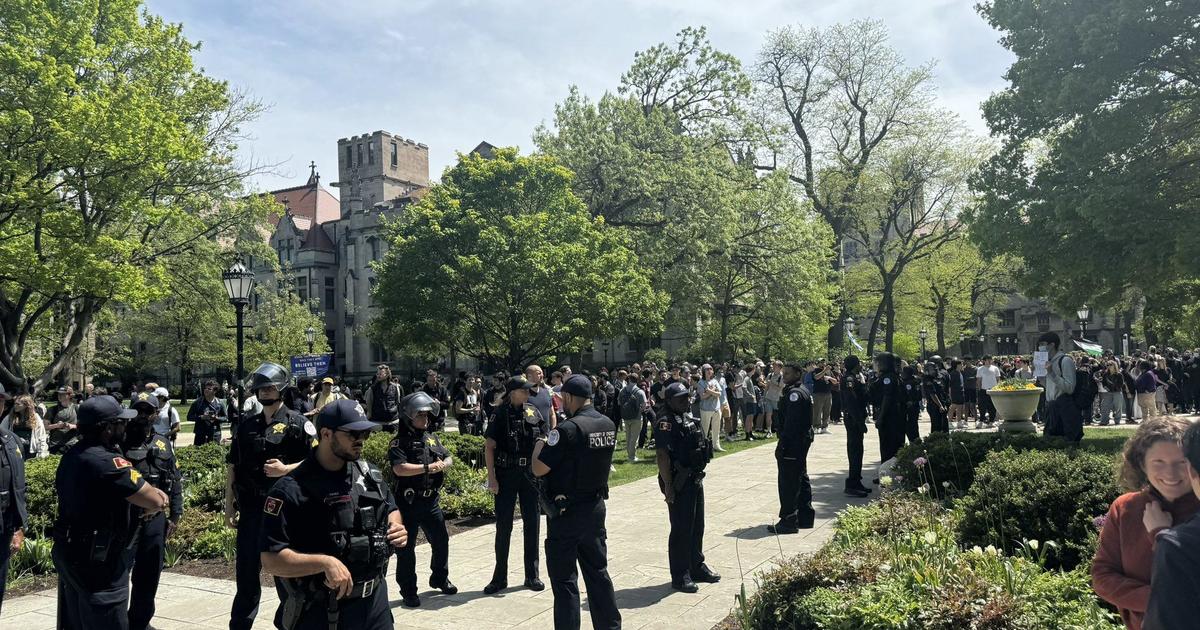Nurses Picket At University Of Chicago Medical Center, Protest Over Staffing Levels And Security Concerns
CHICAGO (CBS) -- Registered nurses are protesting at the University of Chicago Medical Center, claiming poor working conditions prevent them from providing patients with the best possible care.
Nurses have been negotiating a new contract with the University of Chicago Medicine since April, and not surprisingly, the hospital tells a different story.
More than 100 nurses organized an informational picket outside the hospital Monday morning, calling on the hospital to meet their demands, such as increased staffing and security.
The nurses have been working without a contract since April, and have been negotiating with the hospital on several key issues. Their union – The National Nurses Organizing Committee/National Nurses United (NNOC/NNU) said it is concerned about short staffing levels, and a shortage of medical equipment.
Nurses said they also have been verbally abused and physically assaulted by patients or visitors while on the job.
They believe more security protocols need to be in place so nurses will know what to do.
"We do have placards on the walls, and on the doors and windows, that says violence will not be tolerated. But what's most important is nurses don't really have the tools if something does happen. What do we go to? Do we need to call just the manager? You know, we need more security presence," said pediatric nurse Brigitt Manson-McToy.
A hospital spokesperson issued the following statement:
"We believe contract issues are best settled through respectful and cooperative negotiations and that external posturing takes time away from the table. It's important to note that informational picketing is not the same as a strike and that pickets are a common tactic for unions and is part of NNU's playbook to gain attention across the country. The University of Chicago Medical Center remains committed to constructive dialogue and good-faith negotiations to reach a fair and equitable labor agreement with the NNOC/NNU that supports our nurses and enables them to do their best work.
UCMC has a deep respect for the professional practice of nursing, and we thank our nurses for their continued dedication to our patients and excellence in patient outcomes despite working without a contract since April, when the previous Collective Bargaining Agreement expired.
UCMC takes its commitment to staffing seriously and is proud to be a staffing leader in Chicago and the Midwest. UCMC rejects NNOC/NNU's core proposals to move our organization to fixedCalifornia-style ratios. We believe in evaluating our patients' acuity and needs on an individual basis, not based on predetermined fixed ratios that consume resources even when patients do not need them.
The data bear this out. Staffing on our units continues to average well ahead of the fixed ratios that NNOC/NNU advocates, and we remain a health care leader on staffing as shown by Illinois Hospital Report Card data published by the State. Case in point, our ICU averages 1.67 patients per nurse, rather than the 2-patients-per-nurse model suggested by the NNOC/NNU. More information on UCMC's superior staffing is posted on ucmcnurses.org.
In addition, UCMC provides nurses with excellentcompensation and benefits that are above the industry average. Our nurses' average hourly rate under the current CBA is over $47 per hour. This is $11 more per hour than the average pay rate that their peers get at acute-care hospitals in the Chicago area. With even the opening wage package we have proposed, our nurses would remain at the top of the Chicago market. NNOC/NNU has not yet responded to our offer, which was made in June."
The hospital said the informational picket won't have an impact on patient care and hospital operations would continue as normal.
The union said it plans to meet with the hospital again next month.



